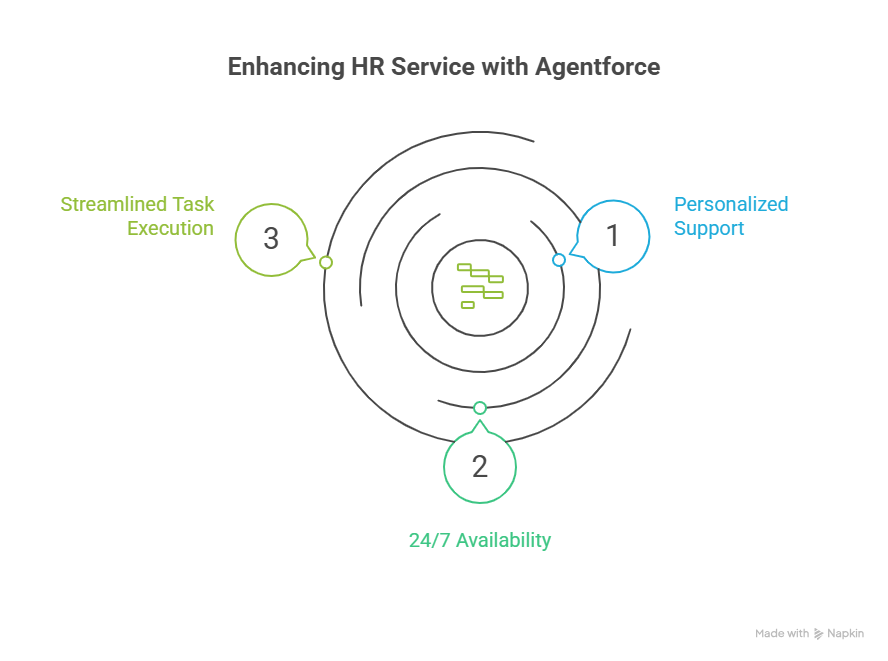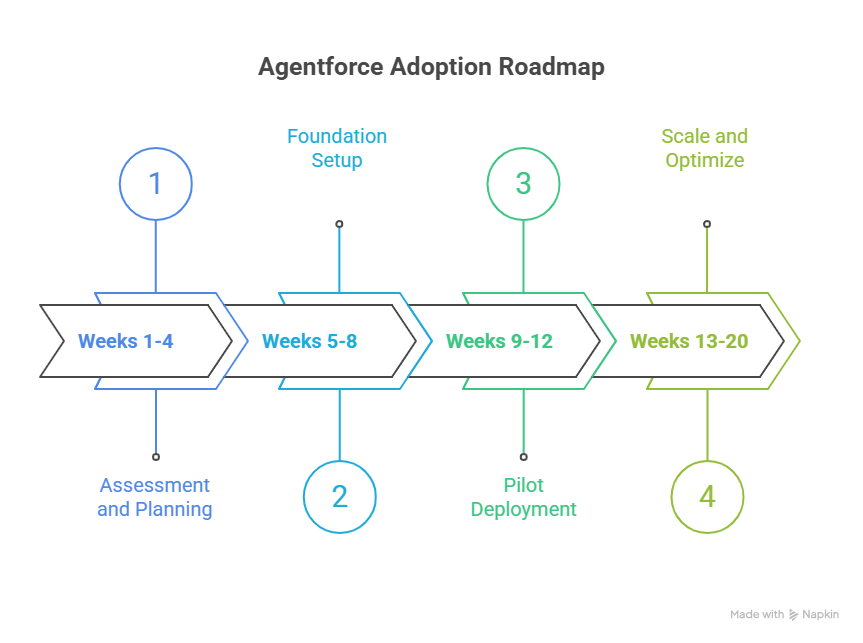Summary: Salesforce Agentforce for HR Service
- How Agentforce for HR eliminates 96% of routine HR interventions while enabling 24/7 employee support
- The strategic shift from administrative HR to value-driven talent management that's reshaping organizational structures
- Quantifiable cost savings and productivity improvements backed by real-world implementation data
- Implementation frameworks and change management strategies for successful digital labor adoption
- Future-proofing considerations for building AI-ready HR organizations
The enterprise HR function is at a breaking point. 90% of HR professionals feel stretched thin and struggle to meet their organization’s needs.
The solution lies in Salesforce Agentforce for HR Service. Salesforce’s HR team sees a 96% self-service resolution rate with this technology which ties into their broader Service Cloud ecosystem and intelligent Service Cloud Implementation strategies.
This represents a critical opportunity to capture significant returns while fundamentally improving the employee experience.
Posts from the workday
community on Reddit
How Does Salesforce Agentforce for HR Service Help Employees?
Modern employees expect seamless, instant access to HR services—just as they’ve grown accustomed to consumer-grade digital experiences.
Traditional HR service delivery models create friction that impacts productivity and employee satisfaction.
With Agentforce for HR Service, employees can perform everyday HR support tasks conversationally right where they spend most of their time, inside Slack or their Employee Portal.
This experience mirrors Salesforce’s vision of workforce management and connected customer 360 solutions.
This eliminates the need to file tickets, dig through policy documents, or navigate multiple systems.
Personalized, Context-Aware Support:
Agentforce tailors its answers to each worker based on employee data and company policies, similar to how Salesforce Health Cloud personalizes patient journeys and Salesforce Data Cloud unifies employee information for smarter insights.
For example, if an employee asks, “Am I eligible for a Gold corporate card?” Agentforce determines eligibility based on their role, location, and company policies.
24/7 Availability Without Human Intervention
Unlike traditional HR teams constrained by business hours, Agentforce provides round-the-clock support. This is aligned with the same innovation seen in Agentforce for customer service and Salesforce Service Cloud Consultant expertise.
Agentforce for HR Service provides 24/7 HR Support, allowing employees to make requests outside of work hours.
Streamlined Task Execution
Employees can complete everyday HR tasks through natural language interactions.
Agentforce empowers employees to easily update their employee profile, manage PTO requests, and change direct deposit details simply by having a conversation with an AI agent.
How Does Salesforce Agentforce for HR Service Help HR Teams?
The transformation extends beyond employee experience improvements to fundamentally reshape how HR teams operate.
Rather than replacing HR professionals, Agentforce for HR augments their capabilities and redirects their focus toward strategic initiatives.
Intelligent Case Deflection and Resolution
The most immediate impact is the dramatic reduction in routine inquiries that consume HR team capacity.
Agentforce makes it easy for employees to track and log HR cases for special requests while automatically resolving the majority of standard requests.
AI-Assisted Human Interactions
When human intervention is required, Agentforce continues to provide value by augmenting HR professionals’ capabilities.
Agentforce can generate recommended replies and summaries based on conversational context and company’s knowledge base.
For example, if an employee submits a non-compliant reimbursement, Agentforce summarizes the company policy and drafts a response.
This eliminates manual research and ensures consistent policy application.
Unified Data Access and Context
One significant operational improvement comes from Agentforce working with Mulesoft to pull employee data from HR systems. This unified approach is part of Salesforce’s larger ecosystem, including integration services and CRM analytics consulting.
This makes it easier to view and update employee details without leaving the HR console.
Salesforce for HR?
byu/Small-Librarian81 insalesforce
Benefits of Salesforce Agentforce for HR Service
The strategic advantages of implementing Salesforce Agentforce for HR Service extend across multiple dimensions of organizational performance. These benefits compound over time, creating sustainable competitive advantages for early adopters.
Lowering HR Service Costs
Cost reduction through agentic AI implementation delivers both immediate and long-term financial benefits. Agentforce has autonomously resolved more than 9,500 support requests in Slack, saving Salesforce nearly $57,000 in support costs. Projections show even greater impact at scale.
The cost savings stem from several sources echoing efficiencies already proven in Salesforce automation tools and Salesforce managed services.
- Reduced Human Intervention Requirements: Salesforce’s HR team sees a 96% self-service resolution rate with Agentforce for HR Service and the Employee Portal
- Decreased Administrative Overhead: HR teams spend a lot of their time on repetitive tasks, and automation directly addresses this inefficiency
- Lower Third-Party Service Dependencies: While outsourcing HR services can reduce admin costs by around $450 per employee, in-house AI solutions often deliver greater savings
Boosting Employee Productivity
The productivity gains from implementing Agentforce for HR Service extend beyond HR team efficiency to impact the entire organization.
Key productivity improvements include:
- Reduced Time-to-Resolution: Average issue resolution time reduced from 48 hours to just 30 minutes with Agentforce
- Eliminated Administrative Friction: Employees spend less time navigating HR processes and more time on their core responsibilities.
- Improved Onboarding Efficiency: An experience-driven automated onboarding process increases new hire retention significantly
Centralizing HR Data and Insights
Agentforce for HR creates a unified view of employee data and HR operations that was previously impossible with fragmented systems.
This centralization enables better decision-making and strategic planning much like improves visibility across functions and Salesforce consulting services guide enterprises through digital transformation.
| Data Integration Benefit | Traditional Approach | Agentforce Approach |
|---|---|---|
| Employee Profile Access | Multiple system logins required | Single conversational interface |
| Policy Information | Static documents requiring manual search | Dynamic, personalized responses |
| Case History Tracking | Scattered across ticketing systems | Unified view with AI-generated insights |
| Compliance Monitoring | Manual audits and reporting | Automated compliance tracking |
Strengthening Compliance and Security
Regulatory compliance in HR operations requires consistent policy application and detailed audit trails.
Agentforce enhances compliance through automated policy enforcement and comprehensive documentation. The same principles apply in Salesforce contract lifecycle management and Salesforce case management for ensuring accountability.
Organizations adopting HR automation solutions gain real-time compliance tracking capabilities. This significantly reduces regulatory risk across global operations.
Agentforce for HR Service at Salesforce
Salesforce’s internal implementation serves as a powerful proof of concept.
Employees have interacted with Agentforce through Slack and the Employee Portal to get help on everything from well-being reimbursements to open enrollment questions and relocation guidance.
This happens with minimal HR team involvement. The internal results demonstrate the technology’s maturity:
- 96% self-service resolution rate across nearly 10 million employee searches
- 75% of cases projected to be resolved autonomously by the end of 2025
- $1.4 million in projected savings from reduced support costs
Nathalie Scardino, Salesforce’s Chief People Officer, calls this the future of work:
“As customer zero of Agentforce, our teams are working alongside agents daily, which has led to increased productivity and empowered our employees to focus on more impactful work”.
Real benefits of using Data Cloud and Agentforce?
byu/StrategyMajor3668 insalesforce
Why Enterprises Are Moving to Salesforce Agentforce for HR Service?
The shift toward Salesforce Agentforce for HR Service represents more than a technology upgrade—it’s a strategic response to fundamental changes in workforce expectations Many companies choose to hire Salesforce developers to adapt these changes into scalable, long-term solutions.
This is similar to trends seen in Salesforce vs ServiceNow comparisons and broader Salesforce Implementation Services projects.
The Shift Toward Employee Experience
Across the market, chief human resource officers (CHROs) say digital labor will soon be essential to their roles.
This reflects a broader recognition that employee experience directly impacts business outcomes.
Modern employees expect the same service quality from internal systems that they receive from consumer applications.
The competitive landscape for talent has intensified this expectation. This makes employee experience a critical differentiator in talent strategies.
Limitations of Legacy HR Systems
Traditional HR service delivery models create friction that impacts both employee satisfaction and operational efficiency.
Legacy HR systems are built on obsolete technology, which does not have the capability required for today’s fast-paced business.
The limitations of legacy systems include:
- Rigid, Process-Centric Design: ServiceNow’s portal-based approach requires employees to visit a separate destination for HR services. Modern solutions meet employees where they work.
- Limited Integration Capabilities: Legacy tools struggle to integrate with modern applications and AI technologies
- Poor User Experience: Traditional HR tools were not built with user experience in mind, making them too complex for non-technical users.
How Agentforce Supports Digital Transformation
The implementation of Agentforce for HR represents a cornerstone of broader digital transformation initiatives.
84% of CIOs say AI will be as transformative as the internet. This positions agentic AI as a fundamental business capability rather than a tactical tool.
Platform-Native Integration:
What makes Agentforce different is the Salesforce Platform.
While many organizations focus on deploying the latest LLMs, the models alone aren’t enough for successful agent deployment.
The unified platform approach reduces implementation complexity.
Skills-Based Workforce Transformation:
Salesforce aims to enable at least 80% of its workforce to adopt these skills by the end of 2025.
This demonstrates the scale of workforce transformation required for successful digital labor adoption.
Agentic AI Mesh Architecture:
Organizations must begin reimagining their IT architectures around an agent-first model powered by innovations like Salesforce Hyperforce and Einstein service agent.
User interfaces, logic, and data access layers need design for machine interaction rather than human navigation.
What are Salesforce Agentforce Implementation Considerations?
Successful deployment of Salesforce Agentforce for HR Service requires careful planning and change management. Many organizations start with structured Agentforce implementation to ensure the platform aligns with HR processes from day one.
It can be critical to integrate AI with diverse HR management systems, communication tools, and external databases to maximize effectiveness. Organizations must ensure data quality and integration capabilities before deployment.
Deploying agentic AI often reveals a skills gap. Successful organizations invest significant effort in training and change management strategies that help employees work effectively alongside agents.
What are Steps for Adopting Salesforce Agentforce for HR Service
The implementation journey requires a structured approach that balances technical requirements with organizational change management.
Phase 1: Assessment and Planning (Weeks 1-4)
- Evaluate current HR service delivery models and pain points
- Assess data quality and system integration requirements
- Define success metrics and business case validation
- Secure executive sponsorship and budget allocation
Phase 2: Foundation Setup (Weeks 5-8)
- Configure Salesforce Data Cloud for unified employee data
- Implement Mulesoft integrations with existing HR systems
- Establish governance frameworks and security protocols
- Begin change management and communication initiatives
Phase 3: Pilot Deployment (Weeks 9-12)
- Deploy Agentforce agents for high-volume, low-complexity use cases
- Configure Slack and Employee Portal integrations
- Train HR teams on human-agent collaboration workflows
- Monitor performance metrics and gather user feedback
Phase 4: Scale and Optimize (Weeks 13-20)
- Expand agent capabilities to additional use cases
- Implement advanced features like autonomous task execution
- Refine AI responses based on user interactions and feedback
- Develop internal expertise and ongoing optimization processes
Change Management and Training
The human element of digital transformation often determines success or failure.
The real hurdles are culture adaptation, skills transformation, and organizational resistance, the very domains where HR professionals excel and IT departments historically flounder.
Skills Development Framework
Organizations must develop comprehensive training programs that address both technical literacy and workflow adaptation.
With just 15% of workers saying that they have the education and training necessary to use AI effectively, reskilling is more critical and urgent than ever.
Communication Strategy
CHROs report their employees remain unaware of how AI agents will impact their work. Clear, transparent communication about the role of AI agents and their impact on job functions is essential for adoption success.
Measuring Success After Implementation
Establishing clear metrics and monitoring frameworks enables organizations to validate ROI and optimize performance over time. This aligns with best practices outlined in Salesforce optimization and Salesforce support & maintenance services
| Success Metric | Baseline | Target | Measurement Method |
|---|---|---|---|
| Self-Service Resolution Rate | 40–60% | 90–96% | Case tracking analytics |
| Average Resolution Time | 24–48 hours | 30 minutes – 2 hours | Time-stamped case data |
| HR Team Capacity Utilization | 60% administrative | 80% strategic | Time allocation analysis |
| Employee Satisfaction Score | Varies by organization | 85%+ satisfaction | Quarterly surveys |
| Cost per HR Transaction | $25–50 | $5–15 | Financial analysis |
Final Thoughts
The transformation of HR service delivery through Salesforce Agentforce for HR Service represents a strategic imperative rather than a tactical upgrade.
Eight in 10 HR chiefs say the workforce will be made up of humans and agents in the next five years.
The question for business leaders isn’t whether this transformation will occur—it’s whether your organization will lead or follow.
FAQs
Can Salesforce be used for HR?
Yes, Salesforce offers comprehensive HR capabilities through Service Cloud’s HR Service solution, which includes both an Employee Portal and HR Service Console. When combined with Agentforce, it provides AI-powered employee support and case management.
Does Salesforce have an HRIS system?
Salesforce doesn’t replace traditional HRIS systems but integrates with them through MuleSoft. The platform enhances existing HR investments by adding AI-powered service delivery and unified data access across multiple systems.
What are the benefits of Salesforce Agentforce?
Key benefits include 96% self-service resolution rates, 24/7 employee support, reduced HR operational costs, improved employee productivity, and unified access to HR data and services through conversational AI interfaces.
What is a Salesforce AI agent called?
Salesforce’s AI agents are called “Agentforce.” These autonomous agents can reason, decide, and take action across various business functions, including HR service delivery, using the Atlas Reasoning Engine for intelligent task execution.

Hasan Mustafa
Engineering Manager Salesforce at Folio3
Hasan Mustafa delivers tailored Salesforce solutions to meet clients' specific requirements, overseeing the implementation of scenarios aligned with their needs. He leads a team of Salesforce Administrators and Developers, manages pre-sales activities, and spearheads an internal academy focused on educating and mentoring newcomers in understanding the Salesforce ecosystem and guiding them on their professional journey.

